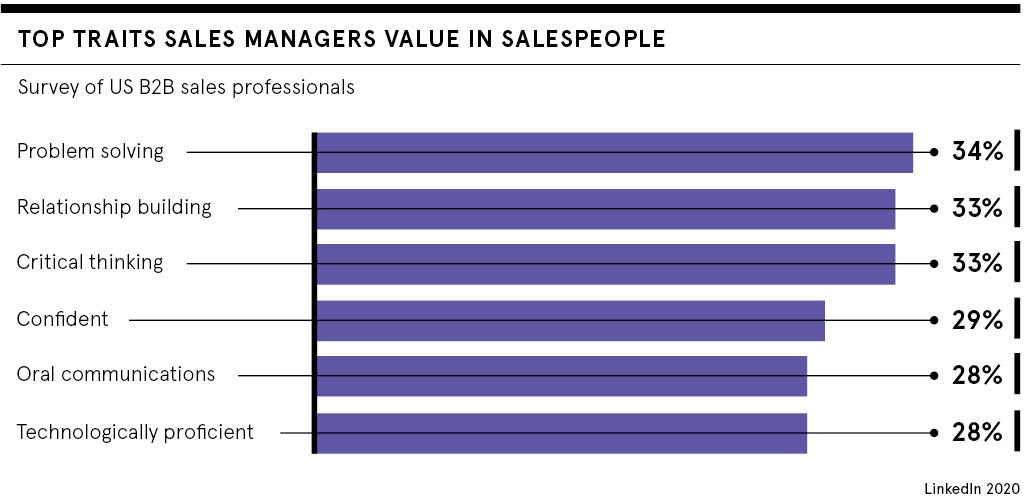The pandemic has jammed the fast-forward button on progress in many industries, mainly for the better. Indeed, concerning the evolution of sales roles, the prevailing feeling is the sudden rebalancing of importance between field and inside sales is long overdue.
The need to sell during COVID-19 has precipitated a doubling down on digital tools within sales organisations and shone a light on the dark arts of those operating in the field. This scrutiny, coupled with the ease of video conferencing and the substantial cost-savings it achieves, has highlighted uncomfortable questions about new and future sales roles, as well as issues around adequate remuneration.
“Traditionally, good salespeople were unmanageable individuals and measured by results,” says Richard Higham, executive director at SalesLevers. “If you were doing a good job, you were bombproof.
“Until a few years ago, inside sales was used for early-stage, low-value transactions and to warm people up before the real heroes [in field sales] would ride out on their Harley-Davidsons to solve the problems.
“But before the coronavirus pandemic, sales organisations had recognised quite a lot of relationships and transactions on a big scale could be managed entirely without meeting people. There was already an increase in transparency with sales roles, as well as a blurring of the edges.”
Digital-first sales strategy
The previous model was forcing cheaper cost of sale towards inside or digital salespeople and higher cost of sales, the big-ticket items, more towards field-based sellers, according to Andrew Hough, chief executive of the Association of Professional Sales.
Now, though, he believes sales teams will neither return to the office nor recommence field-selling until the end of social distancing. Also, the advance and necessary adoption of technology “will allow us to measure things in a more sophisticated way than just first past the post”. Hough adds: “Compensation will become more outcome-based and there will be different ways we measure people.”

This blurring of sales roles is forging a hybridisation of the modern salesperson, says Kathryn Wright, chief sales officer of Upside, a London-based fintech focused on customer engagement.
The role of field sales will be changed forever,” she says. “Technology has enabled us to continue building business relationships and facilitated back-to-back meetings that wouldn’t have been physically possible to achieve before lockdown.”
Dr Peter Colman, partner at consulting firm Simon-Kucher, urges sales teams to become experts at remote selling: “Key and field accounts usually receive close personal attention through the traditional outside sales channel. Sustaining that level of attention is now impossible, which means the mix must change radically in favour of remote sales.”
However, data from growth and sales platform HubSpot shows marketers in the UK are sending 49 per cent more emails than they were before the lockdown, although responses are down by 24 per cent.
Crevan O’Malley, HubSpot’s director of sales in Europe, Middle East and Africa (EMEA), argues that while the current circumstances are unquestionably impacting sales roles, the blurring of roles has been coming.
Merging of skills
“Inside and field sales have been converging in successful ways for some time,” he says. “Skills like emotional intelligence and self-awareness have long been key for high-performance field sales teams, and they’re just as important when you ‘go inside’ and adopt a digital-first sales strategy.
“Personalised engagement via digital channels, impactful language and an empathetic tone are key skills that inside sales need to master for high performance. Lasting business relationships can be built ‘remotely’, but what you say, how you engage and how you make people feel matter more than being face to face.”
This chimes with Richard Langham, managing director, EMEA, at Highspot. “Even before the pandemic, ‘spray and pray’ tactics were failing,” he says. “There’s often only a small handful of key, time-poor decision-makers you’re trying to reach. Flooding their inboxes with billions of one-size-fits-all generic emails doesn’t work. Worse, it actively damages the relationship.”
Hence, the skill of using data has engendered greater respect by sales leaders for those in inside sales. “When used properly, the right data, at the right time, helps your sales team earn a more authentic human connection with the person they’re talking to,” says Langham, who has identified a shift from new customer acquisition to customer satisfaction because of the crisis.
Wright, from Upside, says the sales team of tomorrow “will look more like channel managers and customer-success managers”, and believes embracing data and technology is paramount. “With omnichannel marketing, sales teams can see every touchpoint, every video watched, every document opened,” she says. “This provides two opportunities: an accurate cost per action and feedback on what helps the customer to understand the company’s offering.”
Even before the pandemic, ‘spray and pray’ tactics were failing
Jamie Barlow, managing director at Hyped Marketing, says a 20-80, field-inside sales split is the vision of the future and those who secure sales should be compensated accordingly. With sales roles updating, it’s critical to invest in technology, specifically marketing automation, which enables campaigns to operate autonomously 24 hours a day, Barlow stresses.
“Digital tools allow us to engage on a personal level with hundreds of prospects and help qualify leads,” he says. “We will then take an educated approach as to which point to remove the prospect from the automation programme and engage on a one-to-one level.”
Stephen Corfield, senior vice president and general manager of industry sales for Salesforce in the UK and Ireland, promotes a pairing of “technology with a personal touch”.
“Smart, context-aware customer service will only grow in importance to better serve experiences and value-added interactions,” he says. “The sales team will need to be nimble and wholly data driven in its approach.”
Evidently, sales roles are transforming fast. And for everyone, aside from field sellers on their Harleys, that’s a good thing.
Digital-first sales strategy

